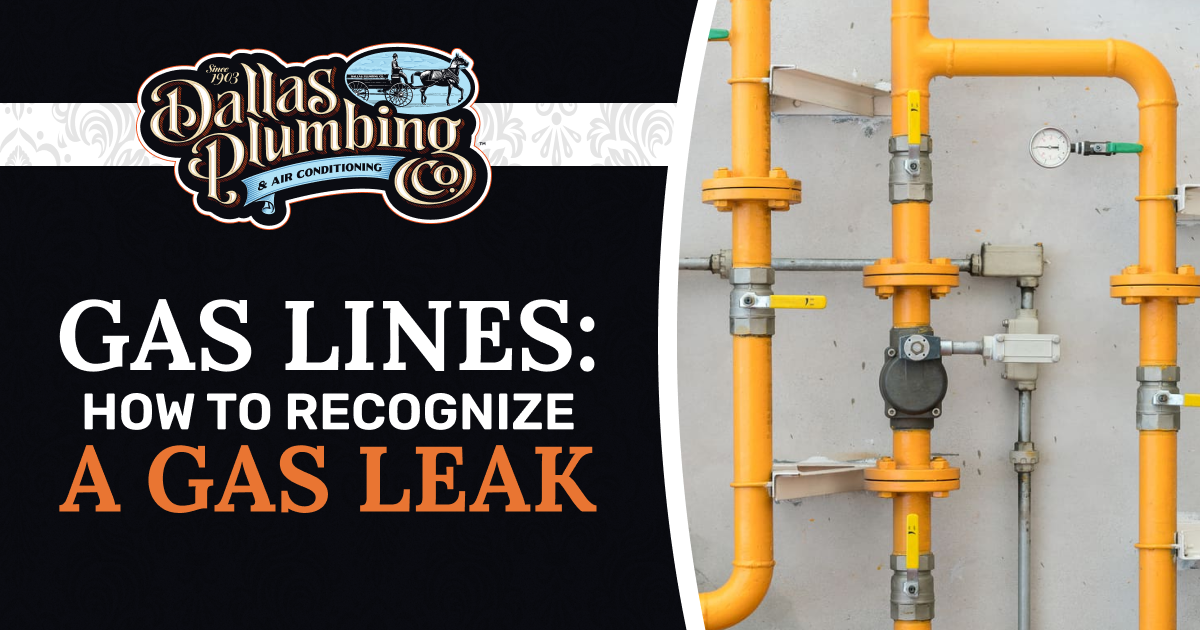Gas Lines: How to Recognize a Gas Leak
On average, gas leaks happen about every 40 hours in the U.S. These numbers are alarming enough to discuss the importance of recognizing gas leaks at home. Gas leaks can pose a serious risk to your health and safety, damage your property and even lead to explosions. As a result, it is important to understand the common signs of repair in gas lines and how to recognize a gas leak to ensure their proper maintenance and safety. Read on to learn how to recognize these signs and keep your home and family safe. Please note that if you recognize any of these signs in your home, you must immediately call an emergency plumber in Dallas.
How Do You Check a Gas Line for Leaks?
Checking for gas leaks can be tricky, but when you’re properly informed about their signs, you can help save your household from a heap of trouble. When you are concerned about a potential gas leak, look for the following signs:
1) The Smell of Gas
Gas has a distinctive smell (think rotten eggs), and if you can smell gas in or around your home, it is time to call an emergency plumber in Dallas. Be prepared to tell them how long ago you noticed the smell, and be sure to ask if you should vacate the property until help arrives. Better to be safe than sorry.
2) Hissing Sound
A hissing sound near a gas line or appliance like a stove could also indicate a gas leak. Make sure to call for help immediately.
3) Increased Gas Bills
Gas leaks require a lot of excess gas, which will show up on your bill. If your gas bill has increased significantly, it may be a sign of a gas leak somewhere in your system.
4) Dead Vegetation
Plants of any kind have little chance to stand against gas. If you notice that plants around the source of gas are dying off, you may have a gas leak. Be sure to call an emergency plumber in Dallas to inspect your gas lines just to be sure.
5) Physical Damage
An obvious sign of a potential leak is when you notice physical damage on the gas lines. Dents, scratches, or cracks are cause for concern and should be repaired immediately to prevent gas leaks.
FAQ About Gas Lines
We compiled a handful of the most commonly asked questions about gas lines and included them in this blog. Find answers to your most commonly asked questions here.
How Long Do Gas Pipes Last?
The lifespan of gas pipes varies based on their material, location, and the wear and tear they experience over time. Here are some estimates of the lifespan of different types of gas pipes:
- Steel pipes – durable and strong, can last up to 50 years
- Copper pipes – corrosion-resistant, can last up to 50 years with good maintenance
- Cast iron pipes – can last up to 100 years, but are not common in homes anymore.
- Polyethylene pipes – flexible and lightweight, resistant to corrosion, can last up to 50 years
Can I do the Gas Pipe Work Myself?
Unless you are a licensed plumber with extensive gas pipe work under your belt, we would strongly discourage you from attempting gas pipe work yourself. If it is done incorrectly, it can be dangerous as gas is very flammable and explosive. In addition to the danger of working with gas, most states require the work to be done by licensed professionals.
How Often Should Gas Lines be Inspected?
Gas lines should be inspected periodically by a licensed professional to ensure that they are safe and functioning properly. The frequency of inspections will depend on various factors, including the age and condition of the gas lines, the type of material used, and the environment in which they are installed. As a general rule, gas lines should be inspected at least once every two years.
Call Us Now for Emegency Plumber Services in Dallas!
Do you suspect that you may have a gas leak in or around your home? Call Dallas Plumbing & Air Conditioning for prompt and professional services. Our plumbers will repair the problem and restore the safety of your home in no time.






